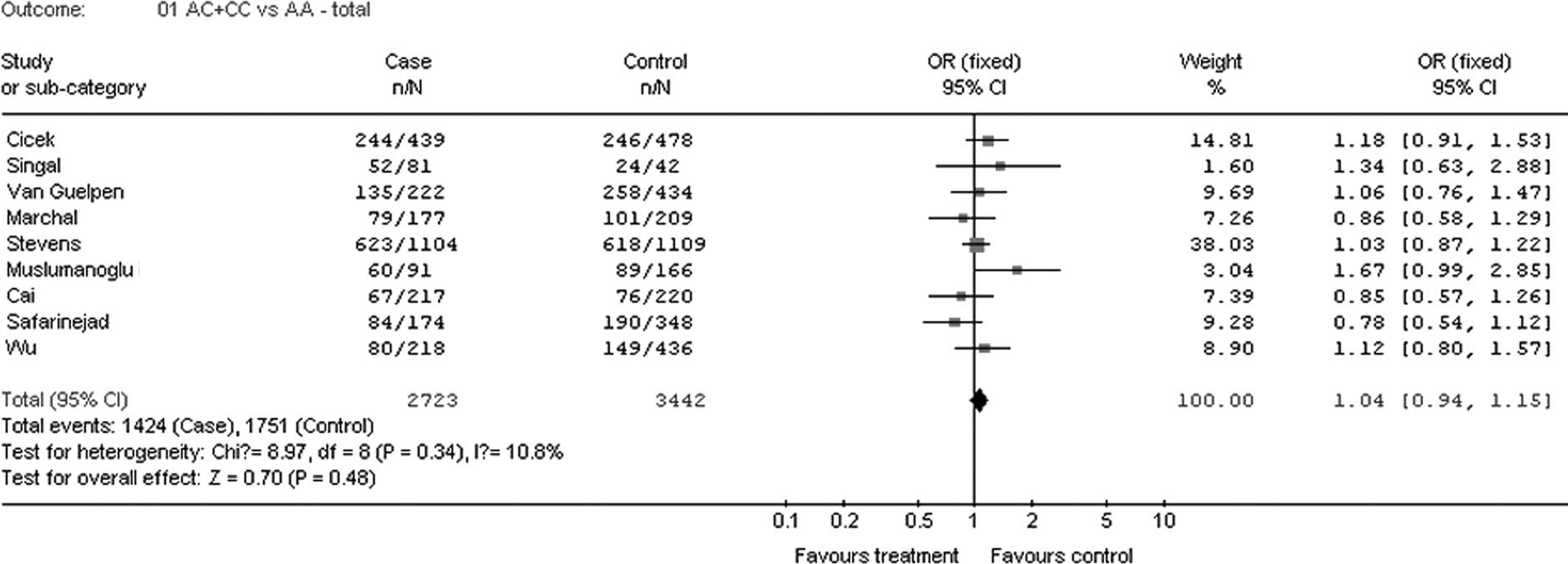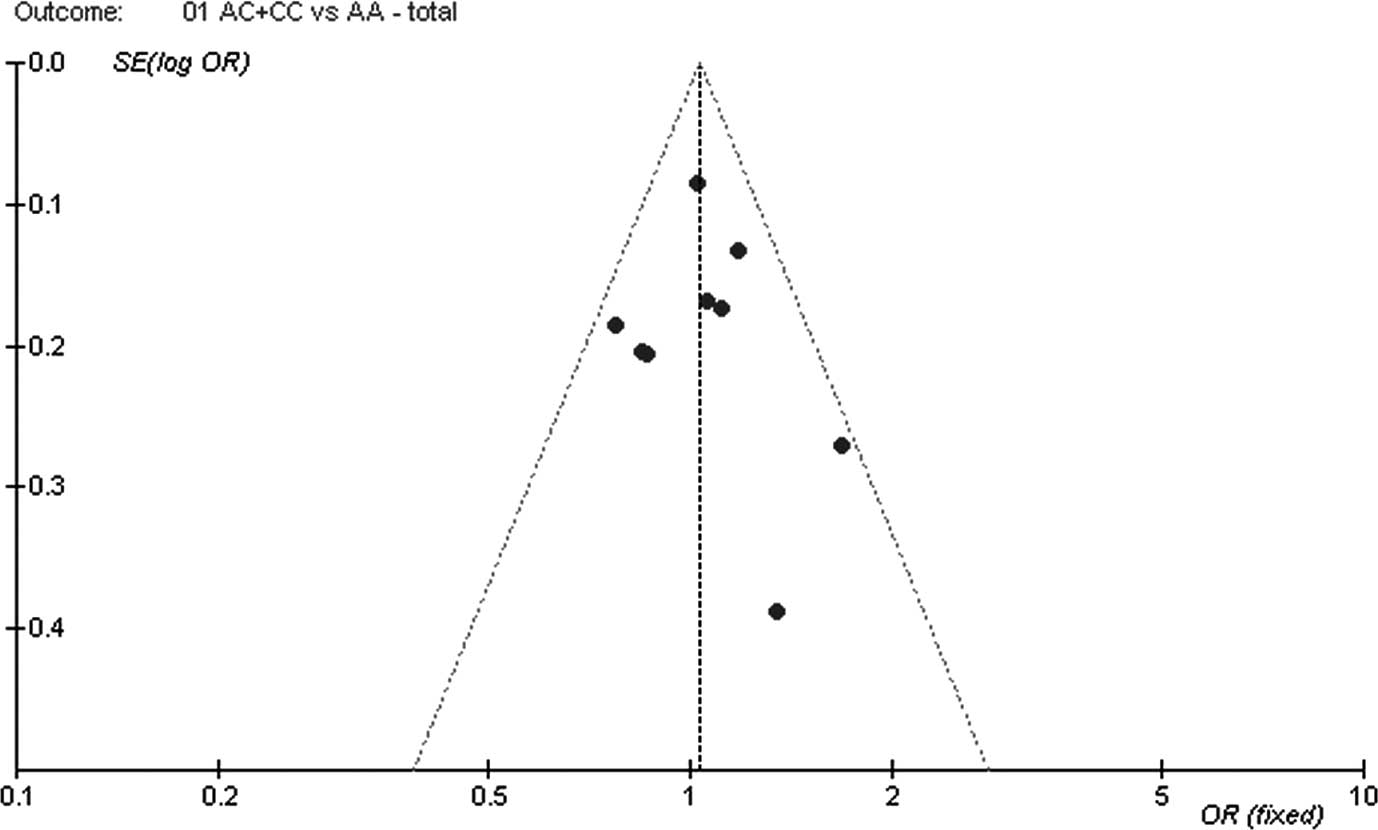|
1.
|
A JemalR SiegelJ XuE WardCancer
statistics, 2010CA Cancer J Clin60277300201010.3322/caac.20073
|
|
2.
|
F BrayR SankilaJ FerlayDM ParkinEstimates
of cancer incidence and mortality in Europe in 1995Eur J
Cancer3899166200210.1016/S0959-8049(01)00350-111750846
|
|
3.
|
AW HsingAP ChokkalingamProstate cancer
epidemiologyFront Biosci1113881413200610.2741/1891
|
|
4.
|
KW JungYJ WonS ParkCancer statistics in
Korea: incidence, mortality and survival in 2005J Korean Med
Sci249951003200910.3346/jkms.2009.24.6.99519949651
|
|
5.
|
JB MasonT LevesqueFolate: effects on
carcinogenesis and the potential for cancer
chemopreventionOncology101727173619968953590
|
|
6.
|
YI KimFolate and carcinogenesis: evidence,
mechanisms, and implicationsJ Nutr
Biochem106688199910.1016/S0955-2863(98)00074-615539274
|
|
7.
|
P GoyetteJS SumnerR MilosHuman
methylenetetrahydrofolate reductase: isolation of cDNA, mapping and
mutation identificationNat Genet7195200199410.1038/ng0694-195
|
|
8.
|
P FrosstHJ BlomR MilosA candidate genetic
risk factor for vascular disease: a common mutation in
methylenetetrahydrofolate reductaseNat
Genet10111113199510.1038/ng0595-111
|
|
9.
|
JR DobosyJL RobertsVX FuDF JarrardThe
expanding role of epigenetics in the development, diagnosis and
treatment of prostate cancer and benign prostatic hyperplasiaJ
Urol177822831200710.1016/j.juro.2006.10.06317296351
|
|
10.
|
TM MurphyAS PerryM LawlerThe emergence of
DNA methylation as a key modulator of aberrant cell death in
prostate cancerEndocr Relat
Cancer151125200810.1677/ERC-07-020818310272
|
|
11.
|
P GoyetteA PaiR MilosGene structure of
human and mouse methylenetetrahydrofolate reductase (MTHFR)Mamm
Genome9652656199810.1007/s0033599008389680386
|
|
12.
|
M KurzawskiK DziewanowskiK KędzierskaA
WajdaJ LapczukM DroździkAssociation of transcription factor 7-like
2 (TCF7L2) gene polymorphism with posttrans-plant diabetes mellitus
in kidney transplant patients medicated with tacrolimusPharmacol
Rep63826833201110.1016/S1734-1140(11)70595-3
|
|
13.
|
JD LeuCY WangHY TsaiIF LinRC ChenYJ
LeeInvolvement of p53 R72P polymorphism in the association of
MDM2-SNP309 with breast cancerOncol Rep2517551763201121479369
|
|
14.
|
JW KimHM ParkYK ChoiSY ChongD OhNK
KimPolymorphisms in genes involved in folate metabolism and plasma
DNA methylation in colorectal cancer patientsOncol
Rep25167172201121109973
|
|
15.
|
MM FungRM SalemMS
LipkowitzMethylenetetrahydrofolate reductase (MTHFR) polymorphism
A1298C (Glu429Ala) predicts decline in renal function over time in
the African-American Study of Kidney Disease and Hypertension
(AASK) Trial and Veterans Affairs Hypertension Cohort (VAHC)Nephrol
Dial TransplantMay2011(E-pub ahead of print)
|
|
16.
|
S DayakarKI GoudTP ReddySP RaoSB
SesikeranM SadhnaniSequence variation of the methylene
tetrahydrofolate reductase gene (677C>T and 1298 A>C) and
traditional risk factors in a South Indian populationGenet Test Mol
BiomarkersJuly2011(E-pub ahead of print)
|
|
17.
|
K SiemianowiczJ GminskiW
GarczorzMethylenetetrahydrofolate reductase gene C677T and A1298C
poly morphisms in patients with small cell and non-small cell lung
cancerOncol Rep1013411344200312883704
|
|
18.
|
H ShenAS NewmannZ
HuMethylenetetrahydrofolate reductase polymorphisms/haplotypes and
risk of gastric cancer: a case-control analysis in ChinaOncol
Rep13355360200515643524
|
|
19.
|
MS CicekNL NockL LiDV ContiG CaseyJS
WitteRelationship between methylenetetrahydrofolate reductase C677T
and A1298C genotypes and haplotypes and prostate cancer risk and
aggressivenessCancer Epidemiol Biomarkers
Prev1313311336200415298954
|
|
20.
|
R SingalL FerdinandPM DasIM ReisJJ
SchlesselmanPolymorphisms in the methylenetetrahydrofolate
reductase gene and prostate cancer riskInt J
Oncol2514651471200415492840
|
|
21.
|
BR Van GuelpenSM WirénAR BerghG HallmansPE
StattinJ HultdinPolymorphisms of methylenetetrahydrofolate
reductase and the risk of prostate cancer: a nested case-control
studyEur J Cancer Prev154650200616374229
|
|
22.
|
C MarchalM RedondoA Reyes-EngelAssociation
between polymorphisms of folate-metabolizing enzymes and risk of
prostate cancerEur J Surg
Oncol34805810200810.1016/j.ejso.2007.09.00817967524
|
|
23.
|
VL StevensC RodriguezJ SunJT TalbotMJ
ThunEE CalleNo association of single nucleotide polymorphisms in
one-carbon metabolism genes with prostate cancer riskCancer
Epidemiol Biomarkers
Prev1736123614200810.1158/1055-9965.EPI-08-078919064578
|
|
24.
|
MH MuslumanogluE TepeliS DemirThe analysis
of the relationship between A1298C and C677T polymorphisms of the
MTHFR gene with prostate cancer in Eskisehir populationGenet Test
Mol Biomarkers13641645200910.1089/gtmb.2009.004619814618
|
|
25.
|
D CaiL NingC PanAssociation of
polymorphisms in folate metabolic genes and prostate cancer risk: a
case-control study in a Chinese populationJ
Genet89263267201010.1007/s12041-010-0037-720861582
|
|
26.
|
MR SafarinejadN ShafieiS
SafarinejadRelationship between three polymorphisms of
methylenetetrahydrofolate reductase (MTHFR C677T, A1298C, and
G1793A) gene and risk of prostate cancer: a case-control
studyProstate7016451657201010.1002/pros.21200
|
|
27.
|
HC WuCH ChangRY TsaiSignificant
association of methylenetetrahydrofolate reductase single
nucleotide polymorphisms with prostate cancer susceptibility in
TaiwanAnticancer Res30357335772010
|
|
28.
|
IS WeisbergPF JacquesJ SelhubThe
1298A-->C polymorphism in methylenetetrahydrofolate reductase
(MTHFR): in vitro expression and association with
homocysteineAtherosclerosis1564094152001
|
|
29.
|
NM van der PutF GabreëlsEM StevensA second
common mutation in the methylenetetrahydrofolate reductase gene: an
additional risk factor for neural-tube defects?Am J Hum
Genet621044105119989545395
|
|
30.
|
JL BaiMH ZhengX XiaM Ter-MinassianYP ChenF
ChenMTHFR C677T polymorphism contributes to prostate cancer risk
among Caucasians: a meta-analysis of 3511 cases and 2762
controlsEur J
Cancer4514431449200910.1016/j.ejca.2009.01.02019223177
|
|
31.
|
SM CollinC MetcalfeL ZuccoloAssociation of
folate-pathway gene polymorphisms with the risk of prostate cancer:
a population-based nested case-control study, systematic review,
and meta-analysisCancer Epidemiol Biomarkers
Prev1825282539200910.1158/1055-9965.EPI-09-022319706844
|
|
32.
|
X DongJ WuP LiangJ LiL YuanX
LiuMethylenetetrahydrofolate reductase C677T and A1298C
polymorphisms and gastric cancer: a meta-analysisArch Med
Res41125133201010.1016/j.arcmed.2010.01.00120470942
|
|
33.
|
LX QiuJ ZhangWH LiLack of association
between me thylenetetrahydrofolate reductase gene A1298C
polymorphism and breast cancer susceptibilityMol Biol
Rep3822952299201110.1007/s11033-010-0361-221052845
|
|
34.
|
B WeiZ XuJ RuanMTHFR 677C>T and
1298A>C polymorphisms and male infertility risk: a
meta-analysisMol Biol RepJune2011(E-pub ahead of print)
|
|
35.
|
JN HirschhornK LohmuellerE ByrneK
HirschhornA comprehensive review of genetic association
studiesGenet Med44561200210.1097/00125817-200203000-00002
|
|
36.
|
KJ LieversGH BoersP VerhoefA second common
variant in the methylenetetrahydrofolate reductase (MTHFR) gene and
its relationship to MTHFR enzyme activity, homocysteine, and
cardiovascular disease riskJ Mol Med
(Berl)79522528200110.1007/s001090100253
|
















